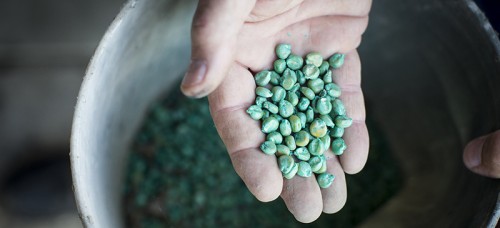
Imagine a world without bananas.
What would you put in your smoothies? What would mingle with the walnuts in your breakfast muffin? Race times in Mario Kart would certainly improve, but how else would we take joy from cartoon characters’ misfortunes?
With a trending emphasis on clean eating and leading sustainable lifestyles, public opinion is quick to decry genetically modified organisms (GMOs) as a part of Monsanto’s insidious plan for global domination. GMOs refer to any biological matter containing genetic material that has been altered via methods of genetic engineering or biotechnology — essentially, the manipulation of an organism’s DNA sequencing.
A common misconception is that GMOs are the relatively new brainchild of profit-greedy men in suits. However, the practice of splicing and tweaking cultures and enzymes dates back to Sumerian culture nearly 5,000 years ago. In reality, the scope of geneticallymodified organisms has a reach far greater than a single corporation’s nefarious business practices.
In fact, you are able to enjoy bananas in present day thanks to the efforts of genetic sequencing and precise cultivation practices.
During the 1950s, the most popular variant of the banana was the Gros Michel — that is, until the entire variety was wiped out by a South American fungus. Fortunately, the Gros Michel was replaced by a disease resistant banana called Cavendish.
Now, a new disease has emerged that is threatening not only the bananas we know and love, but also starchy plantains that are the staple of many diets in developing countries. Global food conditions are already troublesome — could you imagine the consequences if one of the few, basic staples for impoverished nations was eradicated?
Funded by the Bill and Melinda Gates Foundation, a decade long project has been underway by Dr. James Dale of the Queensland University of Technology to develop a biofortified banana that also contains boosted amounts of iron and Vitamins A and E. Along with scientific endeavors to save the Cavendish, the research behind this new genetically modified varietal would be integral towards alleviating widespread nutritional deficiencies in underdeveloped nations.
Chipotle recently drew both praise and criticism for announcing plans to remove genetically modified ingredients from its menus. While the move is a step in the right direction of mindful consumer habits, it also perpetuates the overhyped public distrust of “Frankenfood” with which GMOs have become synonymous. Not to mention the enormous effort that Chipotle’s new plan would impose: cross-contamination and the presence of GMO components in many ingredients make this a seemingly daunting task.
Extensive research and studies have shown there are not “any significant hazards directly connected with the use of genetically engineered crops,” according to a conclusion published in the journal Critical Review of Biotechnology. A team of scientists embarked on a 12-month process to collect and evaluate 1,783 research papers, reviews and reports on the effects of GMOs published from 2002 to 2012.
The findings are supported by the National Academy of Sciences, the American Association for the Advancement of Science and the European Commission, which all agree that GMO foods are safe for consumption. In the United States, rigorous testing by multiple entities (the U.S. Department of Agriculture, the Environmental Protection Agency, and the U.S. Food and Drug Administration) occurs to determine the safety and health effects before genetically modified foods are commercially available, according to nonprofit organization the Genetic Literacy Project.
As with any heavily debated topic, GMOs are not on a cut-and-dry platform. There are certainly critical factors to take into consideration with how business practices are implemented along with the associated socioeconomic consequences, but ultimately, GMOs are not inherently deceitful. There is a wide range of benefits that genetically modified food sources can impart on impoverished countries.
Of course, the world will keep spinning even if bananas do become extinct, but your smoothie may never taste the same again.








Alastair Carnegie • Aug 29, 2015 at 9:36 am
None of us can forget how Professor Ahpad Puztai was treated after the Rowett Institute in Edinburgh, declared “Cross Species” Genetically Modified Organisms to be intrinsically unsafe and a probable lethal poison, totally unfit for human consumption.
A message was relayed from Washington, though the UK’s Prime Ministers Office demanding that Dr. Ahpad Puztai was immediately sacked. and the prestigious Rowett Institute was closed down.
This has lead to Scotland banning GMO’s in perpetuity, and at the time initiated a Royal Military Police investigation into the possibility, that Monsanto were holding governments to ransom, after orchestrating the theft of about one hundred Soviet Suitcase Nuclear Bombs. Monsanto manufacture the Polonium-Beryllium Oxide Neutron Trigger material needed to keep these nuclear devices active. Government have been told by their own Scientists how deadly poisonous GMO’s are, there has been an alarming increase in fatal health conditions. The Flavour Savor “Poison Arctic Fish-Tomato” was withdrawn from market, due to clogging up Hospital Casualty Wards.
Any Academic Body, promoting GMO’s as ‘safe’, will be flagged up by the Military Police as suspect. I served with the R.M.P.T.A. as a UK Home Office Police Surveillance Instructor. We do not need permission from a Judge to monitor 100% of all electronic communications. We have multiple copies of all communications since ca. 1978. These can now be examined by ‘Artificial Intelligence’. We regard GMO’s as a Genocidal Mass-Murder Operation. Guilty until proved innocent, due to the gravity of the accusations. The first stage before prosecution is “Discovery” the Trials will NOT be by a Civilian Court, if this ‘Discovery Process’ warrants ‘Arrest’. High Treason has never in the History of Mankind reached such an altitude before!
P Kleiss • May 18, 2015 at 9:02 am
Your wonderful article aside, there are a couple of major issues with the propagation of GMOs worldwide. One is the association of pesticides and herbicides that accompany these GMO crops. 80% – 90% of GMO corn and soy in North American is “Roundup Ready,” and are thus sprayed with tons of glyphosate – a chemical linked to many human illnesses and labeled by the World Health Organization as a “Type 2 Carcinogen.” Other GMO crops have their pesticides built into the crop itself. You cannot wash the toxins off. Secondly, GMO crops sprayed with roundup kill competing non-GMO crops. This leads to a dangerous lack of biodiversity. One of the points of this article was the effects of a virus wiping out a strain of banana. With non-diverse GMO crops the risk for viral extinction is far greater than with a healthy mix of crop breeds.
David Miller • May 25, 2015 at 3:19 pm
you are correct. I was raised on a farm. Nothing bothers me more than people not understanding what a danger mono-crops are.
I would like to point out one thing though. Their is a world of difference between cross breeding plants to get the traits we want and artificially modifying that plants gene code. There was a study done a few years back that disappeared rather quickly, it covered two of the major selling points that Monsanto uses for it’s round up ready seed. The first is soil depletion. Roundup ready crops were supposed to need less fertilizer, this turned out to be false since the study found that GMO corn used up more nitrogen than regular corn. The second was yield. GMO soybeans has between 30 to 40 percent less yield than regular soybeans. GMO isn’t the panacea that Monsanto wants us to believe it is.